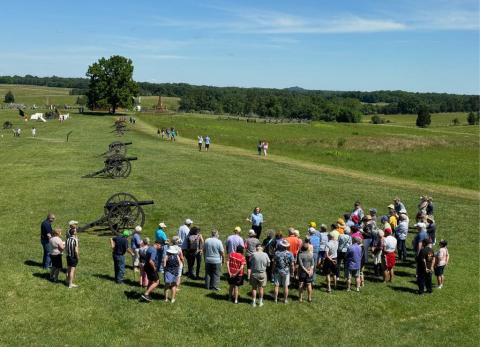
My name is Taryn Tuttle, and I’m a third-year majoring in Government and Religious Studies at the University of Virginia. I spent my summer interning at Manassas National Battlefield Park through the Nau Civil War Center. Over the course of the summer, I had the opportunity to develop new skills and polish others, engage in meaningful, perspective-shifting research, and make genuine connections.
I had never been a particularly passionate student of the Civil War more than any other subject in history, but I did have my reasons for applying to work at the Manassas battlefield. I moved to Manassas on July 1, 2022, and less than two months later, I came down to Charlottesville to begin my studies at UVA. Every time I came home on a break, I knew nothing about the city and communities around me. When I saw a flier in Nau Hall advertising the Manassas internship, it clicked that I had before me a chance to get to know more about the place that was now my home and the people who had been my neighbors for more than two years.
I began my training at the park’s headquarters on May 20, with very little idea of what to expect. In my mind, I had imagined dusty tomes and great maps viewed through gigantic magnifying glasses, which I would’ve found no less intriguing. Instead, I entered a bright room with packets laid out bursting with information, a cheery supervisor speaking of working with the public, and bright young fellow interns eager to shake my hand and learn together. From that moment on, the tone set in that conference room defined the shape of my internship.
We began with a whirlwind crash course in the history of the site, the history of the National Park Service, and interpretation as a skill and trade. Elizabeth Hokanson (the ranger in charge of the internship program) led classroom sessions, while Jim Burgess (the ranger unanimously regarded as knowing the most about the park) gave us tours of the battlefield and related sites. As we underwent training, we began to develop individual tours on the history of Henry Hill, the site closest to our Visitor Center.
In doing so, we began our transition into front-line operations, meaning that we were ready to man the front desk and begin leading our Henry Hill tours. While most of our guided tours had ten to thirty guests, depending on the day and the weather, my first ever tour had more than 70 people on it! Although I was nervous, it went very well. Each intern had an opportunity to give his or her tour three times, and then the fourth was audited, meaning that it was attended and critiqued by our supervising ranger. Toward the end of the summer, we also had our final audits, which were used to evaluate our progress and performance.
As we settled into a rhythm of guiding tours one day and operating various park sites the next, several of the interns chose to take on additional tasks and develop longer tours. I chose to research and write a tour about the Robinson family, a free Black family that lived on-site during the Civil War and managed to preserve their family and home from the threats of slavery and the battles that ravaged their literal front yard. Our special programs lasted longer than the typical 45-minute tour and covered more ground. My tour, for example, covered approximately two miles and lasted for more than an hour. The park staff gave me a lot of freedom to create my program, and I sifted through historical documents to gain an understanding of the less widely known family. On the day I led my tour, I managed expectations about attendance. An irregularly-offered tour that walked much further than the typical Henry Hill tour was not one I expected to be very popular. To my surprise, more than fifteen people attended, and it was an amazing group! They were deeply engaged in the material, and I found the experience very fulfilling.
Aside from my personal tour, the highlights of the summer were the park-wide special events that occurred: the opening of the Blacksmith’s Shop for Juneteenth and the anniversary of First Bull Run, the first of the two battles fought at our site. I was lucky enough to work very closely with Emma Nostheide, the ranger in charge of Junior Ranger and children’s events. I assembled crafts, took many trips to the beloved paper store, and, most especially of all, worked with the visiting children to help them explore archaeology. The children were one and all inquisitive and interested in the history of the area, and it was very rewarding to be able to help them engage with the park.
Over the course of my internship, I was able to learn so much about the history of my home city and hone my public speaking skills, and I’m very grateful for the opportunity. I feel that engaging with the public allowed me to become more confident in myself and have more grace when speaking to large groups of people, a skill that anyone would be benefited by developing. Additionally, in working with the rangers and staff of the park, I was able to make genuine personal and professional connections, which I look forward to maintaining as I move forward with my career.